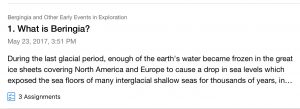Old People Explored
Hey, you know how people explored? Yesh? Cool. Well guess what? We’re learning all about it! Welcome back to my blog, and today we are talking about what we have been learning about exploration in the olden days.
Trade, Exploration, Old people with cool clothing taking boats to strange lands, naming them and then making a civilization there and stupid mistakes. We’ve been learning about it all. Its been great. Who knew that the people who found Hudsons Bay actually thought it was the ocean… or that Newfoundland was thought to be Asia? The internet. Thats who. And teachers. And now, the PLP 8 class at Seycove.
There was another project. Because I mean, who doesn’t love a fourth project for the end of the year? This one was a comic (*dramatically poses while crowd ooohs in surprise*). And it was actually quite fun. But it comes in after I explain what we learnt about first.
What we learnt!-
So we learnt a lot. We started with a post in iTunes U called “What is beringia?”
Beringia was a land bridge. And animals took this land bridge to new places. And people follow food, because they need to survive. So hence came an unknown exploration and land bridge. People migrated with the animals to new places because of Beringia.
And then came the posts about the Norse and their explorations to North America. And the Portuguese with their long narrow ships with two masts called caravels (like the castle in Narnia? … oops thats Cair Paravelle. Oh well). And how the Chinese and Arabs had everything they needed to become great explorers, however both decided not to for different reasons.
The Chinese and Arabs~
The Chinese decided not to explore because their emperor told them that they should focus on themselves and make china the greatest place ever!
The Arabs already had everything. They didn’t feel the need to travel Europe because there was nothing there they didn’t already have.
The Norse ~
The Norse were kind of like “The first expedition dudes”. They found a place in North America and called it Vinland. They stayed there for two years at the most. Meaning that they lasted through at lease one winter. They named it Vinland because of its berries. The proof? People found Norse artifacts at the site indicated that was “Vinland” with the artifacts dating to the time people inhabited the area. These loses cost the Norse their command of the sea. By 1450, the Greenland settlements had disappeared also.
The Norse also occupied Greenland and Iceland and Norway.
For nearly 500 years the Norse occupied Greenland. However, with climate change stopping the traders and supplies and the Black Death killing many of their inhabitance in both Norway and Iceland in 1349. These loses cost the Norse their command of the sea. By 1450, the Greenland settlements had disappeared also.
The Comic Project!-
Attention Attention! Its time for the project part of the LPP! Everyone gather around! Ok… “Knock knock?” … “Who’s there” … “A comic about Samuel de Champlain!” … “ok?”.
For this project we had to make a comic book (oooh such a twist!). But it wasn’t just any comic book. It was a comic book about Samuel de Champlain, the founder of Quebec! At least ours was…
You see, for this project groups were assigned to make a comic book about one of the great adventurers of the exploration ages. Then we had to choose one of their voyages to make into a comic. The comic was to be made as though we were crew mates on the ship they voyaged on and were there for the whole thing.
My group (Melanie, Alivia, Raina and I) were assigned Mr. Samuel de Champlain. The voyage of his we chose? The one where he founded New France (Quebec).
Incase you didn’t catch it from the comic:
In our story, Champlain was called to complete a mission. To create a colony on the shores of the St. Lawrence River (En Québécois… *In -the now known as- Quebec) or else he would be killed (harsh I know). He found a good place to make New France (Quebec) but some issues arose with the natives. In the end, the french invaders (Champlain and his crew- aka us) stayed and created New France.
Now you know what we have learnt so far about the trades and expeditions, head on to read about what they taught us about other (like the renaissance, Middle Ages, dark ages, the ages of feudalism and the scientific revolution) history in my Post “This Changes Everything).
Thanks for reading, hope you enjoyed!





